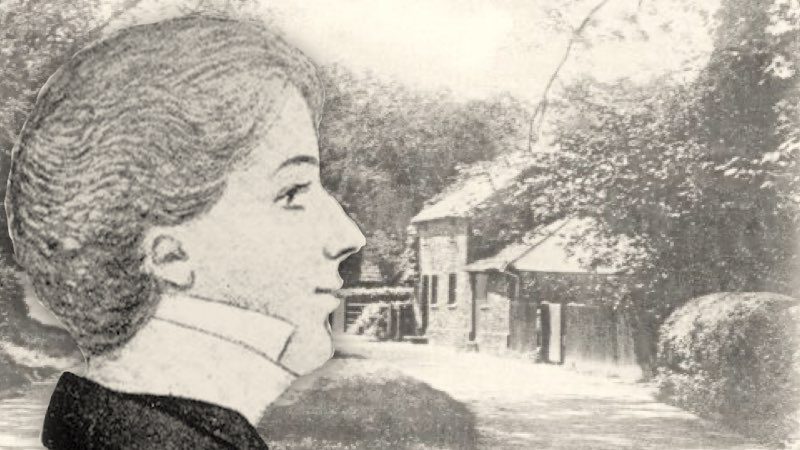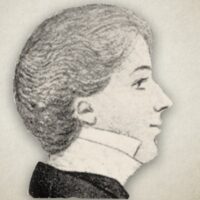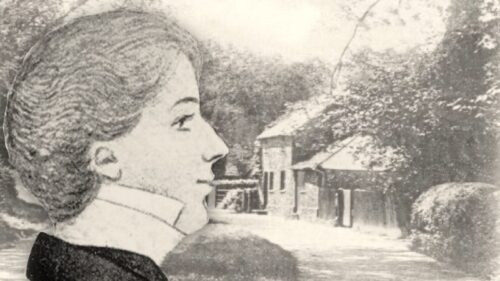
A Sharp Letter To An Unbeliever
July 12, 1830
My dear Sister,
I am truly rejoiced that the Lord has given you an inquiring mind. You will not be distressed when I say that I have discovered that your views of salvation by free grace are by no means clear, as your letter plainly evinces; for in speaking of some of your relations you say, “I wish they would fix their minds above this world.” This expression shows that you do not believe “there is no health in us.” We could as soon make a new world as begin a spiritual work in our souls. It is this doctrine that lays man so low in the dust.
You have expressed a great wish to see me, and that others anticipate my arrival in Oakham. I can assure you that you will not very much like to hear the truths the Lord has taught me. I have given you nothing but milk, either by letters or by the sermon as yet, which is plainly seen by the little dislike with which my sermon has been received by you. I have things to say, “hard to be uttered,” because you are “dull of hearing.” The greatest offence is given when you pull down the strongholds of Satan, when you expose false religion; but remember that no one is to be heard any further than the Scriptures bear him out. I have given great offence in speaking upon prayer as wholly a spiritual work; for God is a Spirit, and those who worship Him must worship Him in spirit and in truth. It troubles exceedingly the Pharisees; they are very unwilling to cast away their false idols. But it matters not to me whom I offend. Is it scriptural? Whatever is scriptural I hope God will enable me to speak boldly and faithfully.
It seems very cutting to parents when I warn them against making children Pharisees and hypocrites; but the truth is cutting to flesh and blood, for it is sharper than any two-edged sword. When I talk of the holiness of Satan as an angel of light, and his ministers as ministers of righteousness, they look upon me as they did upon my great Master, with hatred and contempt, and cry out, like the very pious in His day of humiliation, “He has a devil and is mad; why listen to him?” But the servant is not greater than his master, and if they call the Master of the house Beelzebub, what will they say of His household? We must be looked upon as deceivers, and strong opposers of what the professing world calls true religion; “as deceivers and yet true.”
I begin to meet with much hatred and contempt, but my good Master met with much more. The more they revile me falsely, the stronger testimony I have that I am doing the work of the Lord. Who am I that I should disturb a neighborhood? It is not I. What do they care what opinions I hold? It is the work of God that troubles them; it condemns them, as the Lord enables me to take it out of the ‘letter’ and set it forth in the Spirit. So I become a troubler of Israel. Nevertheless, my church is crowded in spite of all their hatred, lies, and contempt. Some who show the greatest hatred to the children of God and the truths I declare, cannot help coming. The Lord, I rejoice to say, speaks by me. I believe that many are brought to the light through my ministry, and others are comforted and built up, being brought out of bondage.
I am very glad to find you have sufficient light to discover the darkness of the neighborhood. Very few preach the gospel, and a blind guide ought not to be followed, for we know what the consequence will be. I cannot in this letter enter upon any mysteries of the gospel. But I recommend you to read your Bible alone. Observe, that all the Epistles are addressed to saints. Observe, that none are exhorted to do good works but those who are heirs of salvation. The dead have no ears; but when the gospel is preached, ears are given by the Spirit to vessels of mercy lying buried in the ruins of the fall, that they may hear the sound and be taught of God. It is an offensive truth, that none are exhorted to good works but those who have the promises. I will give you two or three scriptural proofs—1 Cor. 15:57, 58; 2 Cor. 7:1; Col. 3:1-5, 12; Titus 3:8.
Christ has no concord with Belial. There are two principles in a believer; one can do nothing but sin, the other cannot sin, because it is born of God. (Sol. Song 6:13.) This causes a warfare between these two spirits, the good and the bad; but the good reigns, which enables us to mortify and keep under the flesh, and causes us by the word to bring forth fruit acceptable unto God—for as many as are led by the Spirit of God, they are the sons of God. In a few words, this is the gospel; Christ lived and died for us; all He did was for us, and all we do ought to be for Him. Our warfare is accomplished and our iniquity is pardoned. This is the gospel, this is glad tidings. The world says we are against good works, but in fact we are the only people that advocate good works, acceptable to God through Christ Jesus. Do not take nor any other man for your guide; read your Bible, and call no man Rabbi, for one is your Master, even Christ.
Yours affectionately in the bonds of the everlasting gospel,
William Tiptaft
William Tiptaft (1803-1864) was a Strict and Particular Baptist pastor. In 1831, he oversaw the construction of a chapel in Abingdon, where he remained as the Pastor until his death. John Hazelton wrote of him—
“William Tiptaft…exercised a ministry largely used to the awakening of sinners and to the driving of those who had only a name to live from the false confidences in which they trusted.” Joseph Philpot wrote of him—“He seemed ever ready to make any personal sacrifice for the glory of God or the good of His people. Time, money, health, strength, life itself, he did not consider his own. He felt he was but a steward who held them in trust, and who might be called at any hour to render an account of his stewardship. To live to God, to walk in His fear, to serve and please Him, to preach His truth, to do His work, to know and obey His will, and to be made a blessing to His people, seemed to be his daily end and aim. I have known men of greater natural abilities, of deeper and more diversified experience, of more shining pulpit gifts, of more enlarged views of Divine truth; but I have never seen anyone, whether minister or private Christian, who approached him in his own peculiar line of practical Godliness, carried out with undeviating consistency for the thirty-five years during which I had the pleasure and profit of his friendship. The Churches of truth needed an example of the practical power of the doctrines which they profess. A light, loose, Antinomian spirit had too much prevailed, and with a great deal of religious talking there was a very small amount of religious walking. But however low quickened souls or living Churches may sink, they have still a conscience made tender in the fear of God, and to this conscience William Tiptaft's keen, pithy remarks, and, above all, his Godly life and shining example, commended themselves."
William Tiptaft's Letters




